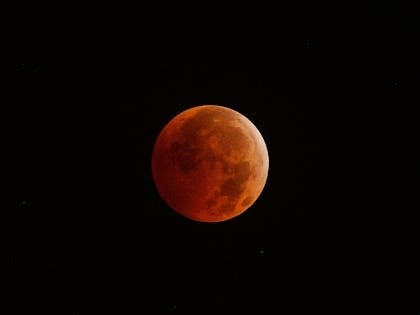Weather
Full Blood Lunar Eclipse, Century's Longest: Watch In Connecticut
A partial lunar eclipse is cause for a watch party in CT to see the full frost moon turn red in the longest such event this century

CONNECTICUT — Mark Thursday and Friday, Nov. 18-19, on your calendar. You may want to plan a lunar eclipse party in your town and watch the full frost moon turn red. It's an overnight party, so get your paid time-off requests in — you may not want to drag your tired self to work.
It's a partial eclipse visible here and throughout North America. It's going to be an impressive event, lasting 3 hours, 28 minutes and 23 seconds. That will make it the longest lunar eclipse of the 21st century, according to NASA.
And in practical terms, it's almost a total eclipse.
Find out what's happening in Ridgefieldwith free, real-time updates from Patch.
Usually, light from the sun paints the face of the moon a grayish-white. But when the eclipse peaks around 4 a.m. over Connecticut on the 19th, our planet will block 98 percent of the sun’s light from reaching the moon’s surface, washing it in a reddish hue.
A partial lunar eclipse occurs when the moon passes through Earth's partial shadow, or penumbra, and only a portion of it passes through the darkest shadow, or umbra.
Find out what's happening in Ridgefieldwith free, real-time updates from Patch.
A total or nearly total lunar eclipse often is called a "blood moon" for this reason. The November full moon, with or without an eclipse, is also called the full frost moon, sometimes called a full beaver or dark moon. All were terms used by Native American tribes, who gave distinctive names to the moons to mark the season. The frost moon is the last full moon of autumn.
Although the eclipse lasts about 3½ hours from start to finish, most of the action takes place in a 2-hour span. Here on the East Coast, prime time will be 2-4 a.m. Nov. 19.
You don’t need any special equipment to see it. All you need to do is walk outside and look up.
If it's cloudy or inconvenient to stay up and watch the eclipse, you can watch a livestream of the lunar eclipse.
This month’s eclipse will be visible throughout most of North America, as well as eastern Russia, Japan, the Pacific Ocean, Mexico, Central America and parts of western South America.
Get more local news delivered straight to your inbox. Sign up for free Patch newsletters and alerts.